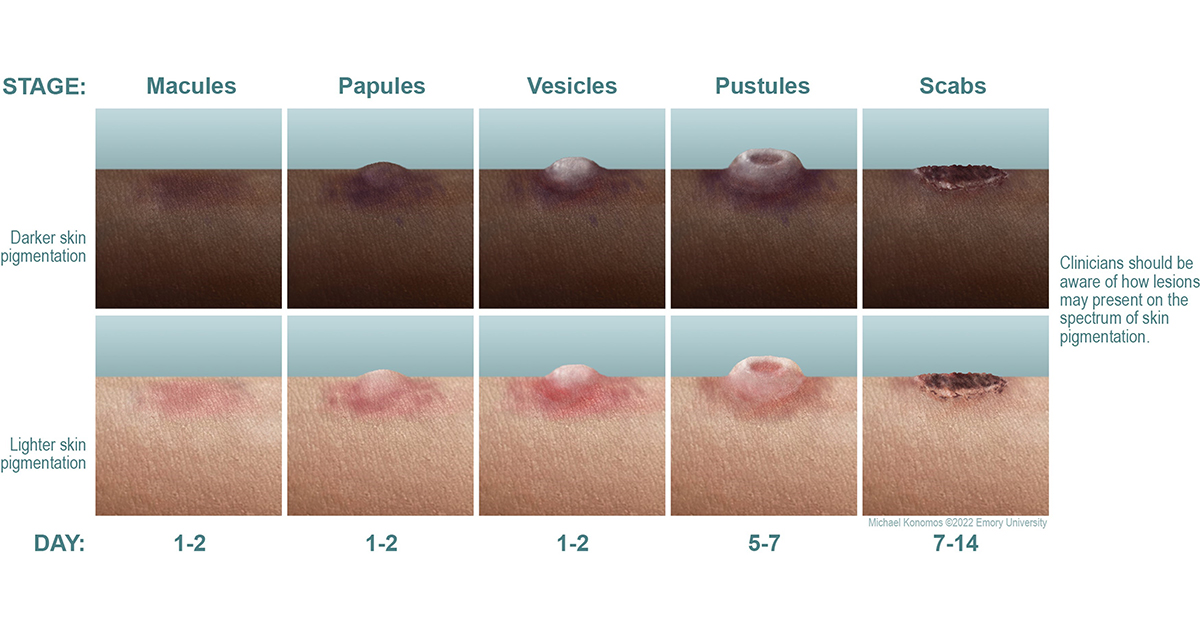August 23, 2024
Mpox 101: Symptoms, Spread, and Prevention
If you have been keeping up with the news, you may have seen that Mpox, formerly known as monkeypox, is now declared a global health emergency. While it is currently mostly found throughout Central African countries, there are cases in other regions as well. Here is what we know about Mpox and how to protect yourself!

What is Mpox?
Mpox is a disease caused by the Monkeypox virus. This virus is related to the one that causes smallpox, but it has no relation to chickenpox. When someone has Mpox, they usually get a rash and some other symptoms.
What are the Symptoms?
The most telltale sign of Mpox is the rash. It may be found near your genitalia, and on your hands, feet, chest, face, or mouth. The rash changes over time, forming scabs before it gets better. You may find that the rash can look like pimples or blisters at first. It may also be painful or itchy.

Other symptoms may include:
- Fever
- Feeling really cold or shivery
- Swollen lumps (lymph nodes) in your neck or under your arms
- Feeling very tired
- Sore muscles and back
- Headache
- Stuffy nose, sore throat, or cough
The time between exposure and symptoms (incubation period) can be between 3-17 days. During this time, people will not have symptoms and may feel fine.
How Long do Symptoms Last?
Usually, you start feeling sick with Mpox within 21 days after you’ve been around the virus. If you feel like you have the flu, a rash will probably show up 1 to 4 days later. If you have a rash or other symptoms, you should see a doctor.
You can pass Mpox to other people from when you first notice symptoms until the rash is completely healed and new skin has grown over it.

How does Mpox Spread?
Mpox spreads from one person to another mostly through close contact. This means touching, kissing, or being very close to someone who has Mpox. It can also spread if you are close enough to talk or breathe near them, as their germs can be in the air. A pregnant mother can also spread the virus during pregnancy.
No studies have shown a link between the spread of Mpox and the water in pools, hot tubs, etc.
It is also possible to get Mpox through touching objects that have been touched by an infected person. This can include clothes, bedding, gear, surfaces, etc. Be sure to disinfect objects, especially in places like gyms!
Mpox can spread from animals to people in a few ways:
- Through small wild animals in West and Central Africa, where Mpox naturally occurs.
- By having close contact with an infected animal, its fluids or waste, or by getting bitten or scratched.
- While hunting, trapping, or handling infected wild animals in places where Mpox is common.
If you have an outdoor pet, you are less likely to get Mpox from your pet, but it can still happen if your pet is infected! If you are very close to your pet—like petting, hugging, or kissing it, or sharing rooms—you could get Mpox from your pet.
How do you Treat Mpox?
Currently, there is no specific treatment for Mpox. Since Mpox and smallpox are closely related, the drugs and vaccines used to treat and protect against smallpox may work as well for Mpox.
Treatment types for those with Mpox will vary depending on how severe the illness is.. Most people with Mpox recover fully within 2 to 4 weeks without the need for medical treatment.
Mpox typically does not leave a scar, but it is possible. The best way to protect your skin is to avoid irritating it when it is healing. So, be sure to not pick at it! Keep it as clean as possible with antibacterial wash or a gentle, fragrance-free wash. You can also use some ointment and keep it covered at all times. Once the wound is healed, be sure to protect it with some sunscreen of at least 30 SPF.
How to Stay Safe
Fortunately, there are vaccines that can help prevent you and others from getting Mpox! The JYNNEOS vaccine helps prevent Mpox. To stay safest, you should get both doses of the vaccine. You need to get the two doses 4 weeks apart.
Avoid close contact with anyone who has Mpox, including sexual contact. Be mindful of how close you are to people. Wash your hands often with soap and water or use hand sanitizer. Wear masks and cover sores.
If you think you might have Mpox, see a doctor and stay away from others until you get checked and tested. It is recommended to wear a mask and cover your sores if you are outside of your home. Others in the same room as someone who is infected should also wear a mask to contain respiratory droplets.
If you have Mpox, stay isolated from others until all your sores have healed, the scabs have fallen off, and new skin has grown. This helps prevent spreading the virus. Follow local health guidelines for isolation, whether at home or in a health facility. If you have sex, use condoms for 12 weeks (about 3 months) after you recover.
In places where wild animals might carry the Mpox virus (like some countries in Africa), avoid contact with wild animals, especially if they are sick or dead, and cook any meat from these animals thoroughly before eating.
